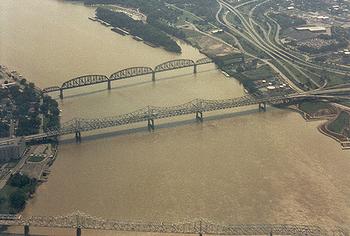Jeffersonville, Indiana Must Minimize Sewage Overflows to Ohio River
JEFFERSONVILLE, Indiana, September 17, 2009 (ENS) - The city of Jeffersonville has agreed to make extensive improvements to its sewer systems to reduce the city's long-standing sewage overflows into the Ohio River at a cost that is estimated to run between $100 and $150 million.
Under a comprehensive Clean Water Act settlement with federal and state governments announced today, the city will improve its sewer system to minimize, and in many cases, eliminate the overflows, by calendar year 2020 or 2025, depending on Jeffersonville's financial health.
The consent decree filed in federal court by the Justice Department, the U.S. Environmental Protection Agency and the state of Indiana requires the city to develop and implement a plan to eliminate or reduce overflows into the Ohio River from its combined sewers with solutions that include the installation of green infrastructure.
 |
The Ohio River flows between Jeffersonville, Indiana and Louisville, Kentucky. (Photo by SteveBillieJean) |
Throughout the year, Jeffersonville's sewer system is overwhelmed by rainfall, resulting in discharges of untreated sewage and overflows of sewage combined with stormwater into the Ohio River, totaling millions of gallons each year.
"This was not an easy settlement to reach, but the agreement is fair to all sides," said Indiana Attorney General Greg Zoeller. "It has been very frustrating to all that wastewater flowed into the Ohio River and nearby streams after heavy rains because of aging infrastructure inadequate to the capacity."
"Violations of the Clean Water Act were all too frequent. The city is agreeing to uphold its environmental responsibilities, and ultimately the public, those who live and work near the Ohio River, will in the long run benefit from these improvements," Zoeller said.
In addition to improving its sewer system, Jeffersonville will pay the United States a civil penalty of $49,500 and the state of Indiana a civil penalty of $8,250, provided that Jeffersonville implements two environmental projects identified in the settlement that are designed to improve water quality in the city at a cost of more than $248,000.
Commissioner Thomas Easterly of the Indiana Department of Environmental Management said, "IDEM partnered with U.S. EPA, the U.S. Attorney's office, the Indiana Attorney General's office and the city of Jeffersonville to reach an effective agreement for eliminating pollutants from Jeffersonville's combined sewer system."
"That agreement includes green infrastructure provisions, such as installing pervious pavers and a rain garden along the river front, which will serve as a model for other cities around the nation," Easterly explained. "This agreement will improve the quality of life for their community and others downstream."
Jeffersonville, a city of 30,000 people, is located on the north bank of the Ohio River, directly across the river from Louisville, Kentucky.
Of Jeffersonville's total sewered area, 15 percent is served by combined sewers while 85 percent is served by separate sanitary sewers. The combined sewers are located in the older, downtown portion of Jeffersonville and lack sufficient capacity to transport all of the combined sewage that they receive to Jeffersonville's wastewater treatment plant during rainfall events.
As a result, Jeffersonville commonly discharges the combination of sewage and stormwater through one or more of its 13 combined sewer overflow outfalls that discharge to the Ohio River.
Now, subject to court approval of the settlement and a 30 day public comment period, the city must implement a plan with specific actions to improve the capacity, management, operation, and maintenance of its sanitary sewer system to eliminate, overflows of untreated sewage and eliminate all discharge points within its sanitary sewer system.
© Thomson Reuters 2009 All rights reserved
